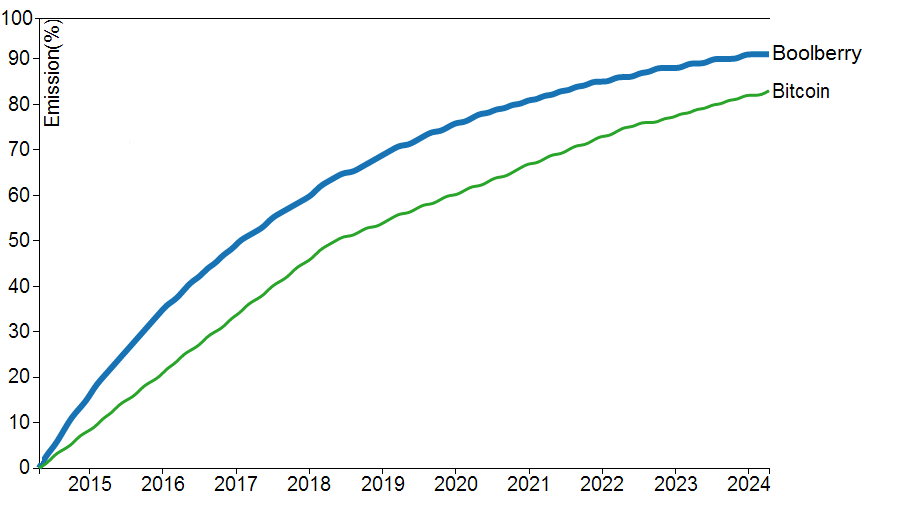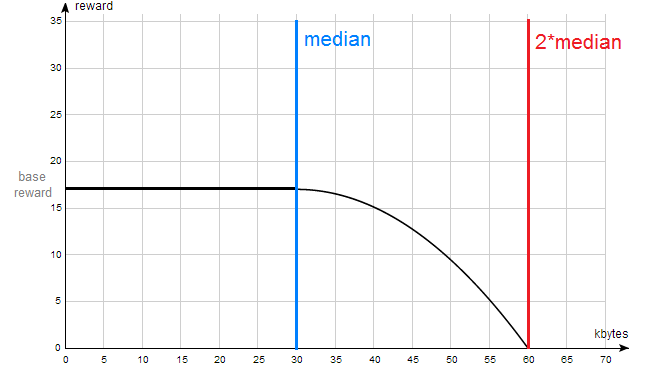Boolberry is a new cryptocurrency based on CryptoNote technology. Boolberry's major benefit is to provide much stronger privacy to both the senders and receivers of transactions. It does so by ensuring that:
Boolberry improves upon the base CryptoNote technology in several ways that strengthen its anonymity and reduce the size of the global ledger of all transactions, called the "blockchain". It provides an aliasing facility built in to the blockchain so that people or programs can send money to, for example, "@zoidberg" instead of a long address. And it has an easy-to-use
GUI wallet that ships in source and binary as an official part of the Boolberry distribution.
The main ideas of Boolberry transaction generation are explained in the following graph:
This picture shows the transaction's creation, the cryptographic protocol which is the basis for the whole technology. More details on theory page
Currency specification
Block reward
PoW hash
Project donations
Money supply: 18446744.073709551615
Block interval: 120 seconds
Default P2P port: 10101
Default RPC port: 10102
84467.440737095516), dev bounties is 1%
Reward Emissions for 10 years:
Day Block Reward Generated Coins 0 17.416264000000 0% 0.000000000000 183 15.359717000000 11% 2179953.768778000000 366 13.546011000000 22% 4102274.357256000000 549 11.946471000000 31% 5797411.627041000000 732 10.535808000000 39% 7292216.288657000000 915 9.291719000000 46% 8610365.351676000000 1098 8.194534000000 52% 9772737.277389000000 1281 7.226907000000 58% 10797742.784839000000 1464 6.373539000000 63% 11701616.548800000000 1647 5.620939000000 67% 12498674.414764000000 1830 4.957208000000 71% 13201540.208042000000 2013 4.371851000000 74% 13821345.733154000000 2196 3.855614000000 77% 14367907.128588000000 2379 3.400335000000 80% 14849880.376022000000 2562 2.998817000000 82% 15274898.428772000000 2745 2.644711000000 84% 15649692.128002000000 2928 2.332418000000 86% 15980196.828462000000 3111 2.057001000000 88% 16271646.419271000000 3294 1.814107000000 89% 16528656.232190000000 3477 1.599893000000 90% 16755296.148816000000
Block reward depends of block cumulative size (includes transaction's blob sizes) and could be less than nominal.
Emission graph, compared with bitcoin:

base_reward=(EMISSION_SUPPLY - already_generated_coins) >> EMISSION_CURVE_CHARACTER; if(block_cumulative_size <= median) reward = base_reward; else reward = (base_reward*(block_cumulative_size * (2 * median - block_cumulative_size)))/(median2)Where:

Warm up: 2161 ms test_wild_keccak<400> - OK: loop count: 100000 elapsed: 3020 ms time per call: 0 ms/call Warm up: 2158 ms test_wild_keccak<40000> - OK: loop count: 100000 elapsed: 3060 ms time per call: 0 ms/call Warm up: 2168 ms test_wild_keccak<4000000> - OK: loop count: 100000 elapsed: 3484 ms time per call: 0 ms/call Warm up: 2156 ms test_wild_keccak<40000000> - OK: loop count: 100000 elapsed: 8119 ms time per call: 0 ms/call 1JjGoHdzP5HvtyEZ6MN9LXbh8uTDVgrPY9 Warm up: 2150 ms test_wild_keccak<100000000> - OK: loop count: 100000 elapsed: 8574 ms time per call: 0 ms/callAs you can see, working on small amount of memory 100000 hash operations takes 3020 ms, meanwhile work on 100Mb scratchpad with the same operations count takes 8574 ms. Such difference(caused by the cache memory exhaustion) points to real memory hardness we guess.
BTC: 1Gz2EQrod8E32i9Cq7zzHTp8WsDsR6tuXe BBR: @zoidberg